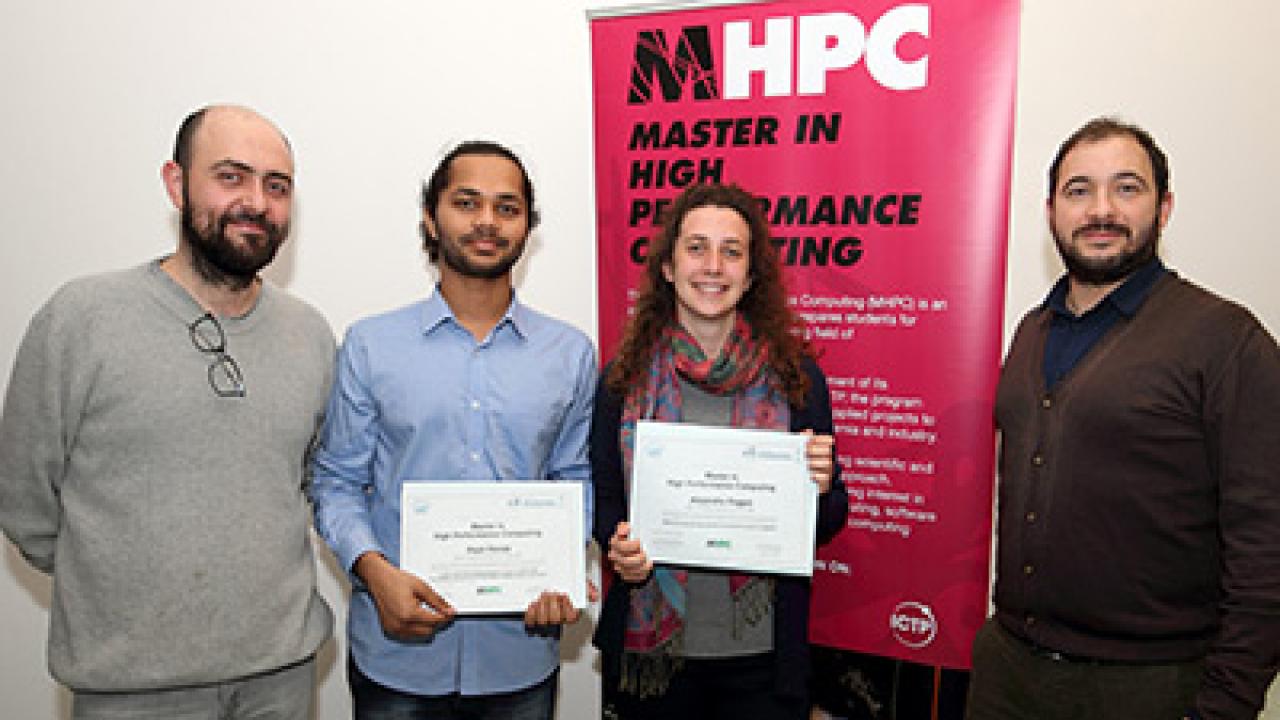
Thanks to support from ICTP, two students from developing countries are among the graduating class of ICTP and SISSA's joint master's programme in High Performance Computing (MHPC). A graduation ceremony was held on Friday 15 February during a special event on 'HPC: challenge the present to innovate the future'. It included a roundtable discussion where regional and national stakeholders discussed new HPC trends and needs, with the aim to increase cooperation and become the best actors in the field in the Friuli Venezia Giulia region of Italy, and beyond.
Both of the students supported by ICTP have excelled at their studies. Alejandra Foggia of Argentina earned recognition for having the best thesis, and presented her work in a lecture during the ceremony. Rajat Panda, from India, completed a thesis that led to a publication co-written by researchers from Harvard and the University of Geneva and submitted to the prestigious scientific journal Physical Review.
MHPC students have the advantage of pursuing their degrees at one of the largest HPC facilities in Italy. Lectures are provided by SISSA and ICTP staff and highly recognized international experts from academia and industry. Both institutes have long histories and experience in developing and applying scientific and research computation models. Students gain valuable hands-on experience by developing and implementing HPC projects, in close cooperation with leading scientific groups. In the case of the two students supported by ICTP, that meant working closely with scientists Antonello Scardicchio and Marcello Dalmonte in ICTP's Condensed Matter and Statistical Physics section. For the coding that was required to integrate their research with the use of the high performance computers, the students worked closely with Ivan Girotto, ICTP's HPC applications specialist.
This hands-on approach to learning, as well as the diversity of the instructors' backgrounds, give MHPC students a glimpse of the many career paths available in high performance computing. "The master's programme opened up a lot of possibilities," says Foggia, adding, "I always wanted to do a PhD, but now I am considering something different, perhaps in industry," where, she says, the emphasis on teamwork and projects appeals to her.
Panda says he is considering the pursuit of a PhD in computational physics. "I have a lot of expertise now in computing, thanks to the MHPC coursework and the instructors," he explains.
Foggia also appreciated the high quality of the MHPC instructors. "The teachers really know a lot, and they have so much to share with you; for me, that was the best part of the programme. I also liked the applied part of the programme. You learn from the examples and you learn from your mistakes."
For Panda, the best aspect of the MHPC was the thesis work. "Through the thesis we were exposed to the state-of-the-art research facilities. The problems you are given are tough enough, and challenging. We wrote coding from scratch to simulate the physics, and used the biggest of computers available."
More details about the MHPC programme are available at https://www.mhpc.it/.
















